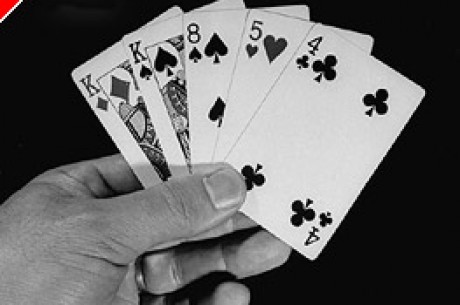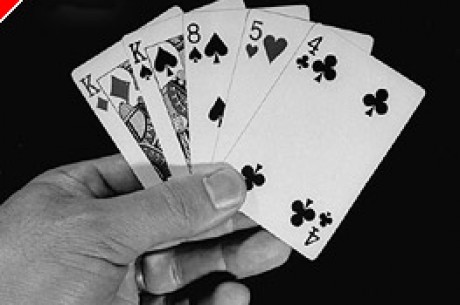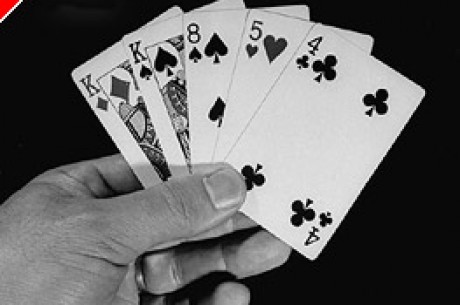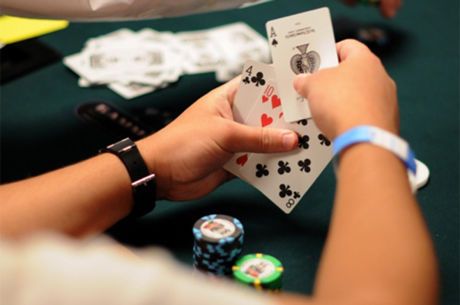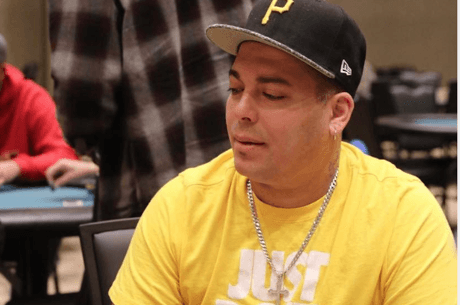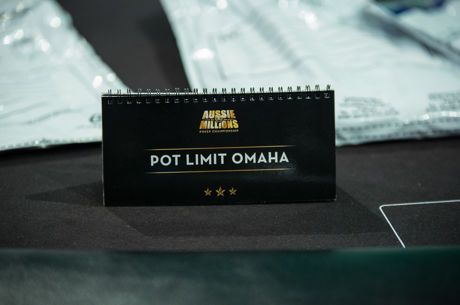Introduction to Omaha - Pot Limit - Hi/Lo Heads Up
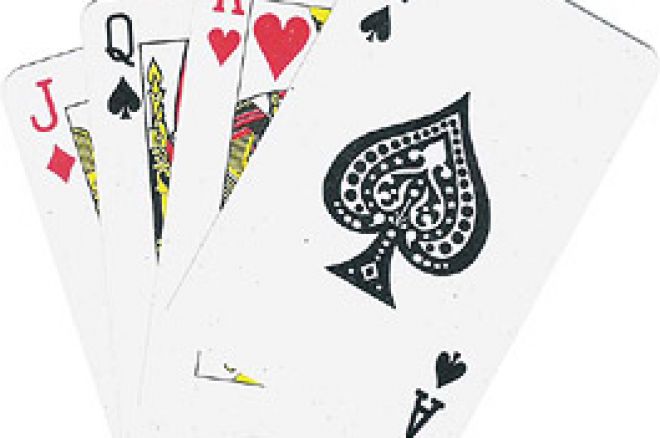
Tony is a regular on-line and card room player living in England. He mostly plays Texas Hold'em and Omaha (High and Split) at fixed, pot and no limit, at both cash and tournament tables.
Introduction
I have a soft spot for Omaha Hi/Lo Split. I think it is because the battle is joined with players who do not always share the same goal at the table. Unlike standard Omaha High or Texas Hold'em where everyone is trying to be the last one standing with the best high ranked hand, I am aware at Hi/Lo Split that there are many opponents who pick up their cards (virtually speaking - on-line) hoping to see A 2 x x. They focus first on the low cards and seem to regard the high cards as less important. Consequently, the game is looser than it should be because of the average-quality hands in play.
So, usually it pays to be tight and wait until the good cards come, usually with one ace or two. Then you can go in heavy knowing there will be plenty of callers donating to your cause. While that may be the case with a multi-handed table, are there exceptions?
Low Blues
Not only is Omaha Hi/Lo Split intriguing and often profitable, it can also be an intensely frustrating game. None more so than when you have built a monster high hand and the board - before the river - shows two cards of 8 or less. You know the large pot is probably all yours unless the river is one of the remaining low cards that doesn't pair the board.
You might hold Ah Qh Qd 3d, raise it up pre-flop and still get 5 or 6 callers. The flop shows 4d 2c Qc. You have the nut set and nut low draw and bet out strongly. Three opponents donate to the pot. The turn is 4c giving you the nut full house and no low is yet made on the board. One player calls your large pot bet. The river is the 3c counterfeiting your low card and not making a low for you. You only have a few chips left so cannot make a monster bet to take your opponent off the hand. He shows 9h 8c 8s 7c.
His flush chase was the sole reason for his calls and even though he made it on the river, it was only 8 high in his hand making it a weak call and the pair on the board was even more danger to him and cost him the high hand. Yet his 8 7 made him a completed low hand, 8 7 4 3 2. Usually this would be useless but you have no low hand at all! Half the pot has gone and your profit on the hand is very small. It's enough to turn you to Omaha High for good!
A player with 9 8 8 7 isn't at all well placed in Omaha Hi/Lo Split. It hardly has anything going for it since any straight made will most likely yield half the pot at most (for the high hand). If the player makes the nuts with 6 5 4 or 7 6 5, you will probably lose the low hand. If the straight is because of J T 9, he might easily be beaten by someone holding K Q or Q 8 so his return is then zero with a big Z. If he flops an 8 for a set, he is still beatable by higher sets. Yet, in this case, your exemplary play has not got its rewards because the player with this hand chased with a poor hand and no grasp of pot odds!
Facing Up
Can you level such an accusation at someone who is playing you heads up at Omaha Hi/Lo? Before the flop, probably not. At heads up in any variation, the two players could be dealt any old tickets and one set of old tickets will beat the other, half the time. If you have anything remotely connected you will probably seek to raise. At pot limit, it might well be enough to end the hand but then again, heads up, there is a lot to be said for calling. You might connect with the flop but, more importantly sometimes, you do not wish to declare yourself a passive player to your opponent or he will just raise you out of the game.
If you are holding the 9 8 8 7 heads up and the cards and betting follow the above example, you will still have to fold on the very poor pot odds unless you believe you can re-raise a pot bet strongly and turn the tables. That requires a deep stack, a lot of resolve and running the risk of ending your interest there and then.
It is not often you find yourself heads up before the flop on-line. However, I played a Sit'n'Go heads up tournament the other day on Pokerstars.com. I noted that my opponent, who had been sitting waiting for a challenger, was active in two or three others. All of them $50 heads-up challenges. Clearly this was a man or lady who had identified a niche. I suspected I wasn't in for a quick ride!
I wasn't wrong there. It took 56 minutes to finally win the tournament after spending the first half an hour slightly behind. As the blinds increased, the swings became greater with both of us at one time or another all-in with hopefully what we felt was the best hand. Eventually it took a big hand which I won because, unlike the example above, the low card did not fall on the river.
I held A K Q x. The flop showed an A and another low card. The turn was a T and the river a T too. My opponent showed A J 4 2 and I took the whole pot with my better kicker to our joint A A T T hands.
Early play was fascinating. I decided I would raise pot (this was only $30 with $5/$10 blinds) with any hand, or else fold the unconnected rubbish. My opponent folded to several of these raises and called a few others. He rarely re-raised. If I raised on the flop, he folded easily. I thought he was tight and passive. This way he did not lose too many chips and occasionally, as time wore on, after my raise on the flop, he would suddenly re-raise me. I was then on the defensive. This early pattern had me down to about 40% of the chips for quite a while and my early bravado waned.
As the blinds increased so did my opponent's raising and I was now down to 30%. Clearly I needed a good hand to meet one he liked. I now had to be patient and wait for the right time to strike. This happened two or three times. I picked up hands like A 2 3 K, A A 2 7 and when that happens, it is "pot raise, re-raise, all-in" if the opponent is so inclined! Inclined they usually are as they have the chips and are keen to end it. I certainly felt my opponent was losing his patience after 40 minutes of jousting.
The third time I took the lead was with the hand already mentioned. Another one finished it off. That was tough. I saw that my adversary had already joined two more battles and was slogging it out in another. Sooner he than me I thought. I noted also that his last four results had been two wins and two defeats. I wonder if he makes a regular income.
Conclusion
The nature of pot limit Omaha Hi/Lo Split is that it is volatile in respect of the betting and also the hand composition as each card comes down. Nonetheless, you can make it less so for yourself by controlling your urges to get involved in hands at a full table unless you hold some strong cards - the usual ones giving you good high potential and if necessary low cards too.
At heads up, this changes before the flop since any half-decent cards might be ahead of your opponent. However, having played a tough tournament against a regular heads-up player, it still seemed to me that passiveness and caution played a big part early on. That player's M.O. seemed to be to lull me into thinking he was passive and later to get very aggressive. The term Passive/Aggressive seemed to be the description that paid off - except this time it paid off for me. I became passive after aggression didn't work early and then aggressive whenever the hand warranted it. That was still usually when my hand had the potential for the high pot. Winning half a pot heads up is a waste of time unless it gets you out of jail!
Either of us could have won it and in some ways that sums up heads up play. Aggression is the key so long as it isn't blind aggression or plain recklessness. You still have to know when to give up a hand. The rest is up to the turn of the cards.
Exorcism
18 August 2005
Ed Note:Noble Poker has 6 handed single table tournaments that we think are easy pickins...get in on the action

